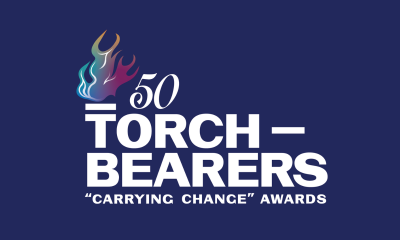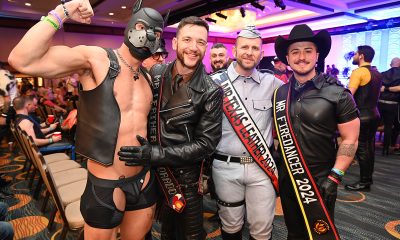Books
Washington Blade editor tells all in new book
Kevin Naff revisits 20 years in the battle for LGBTQ equality in tome that is part history lesson, part celebrity dish
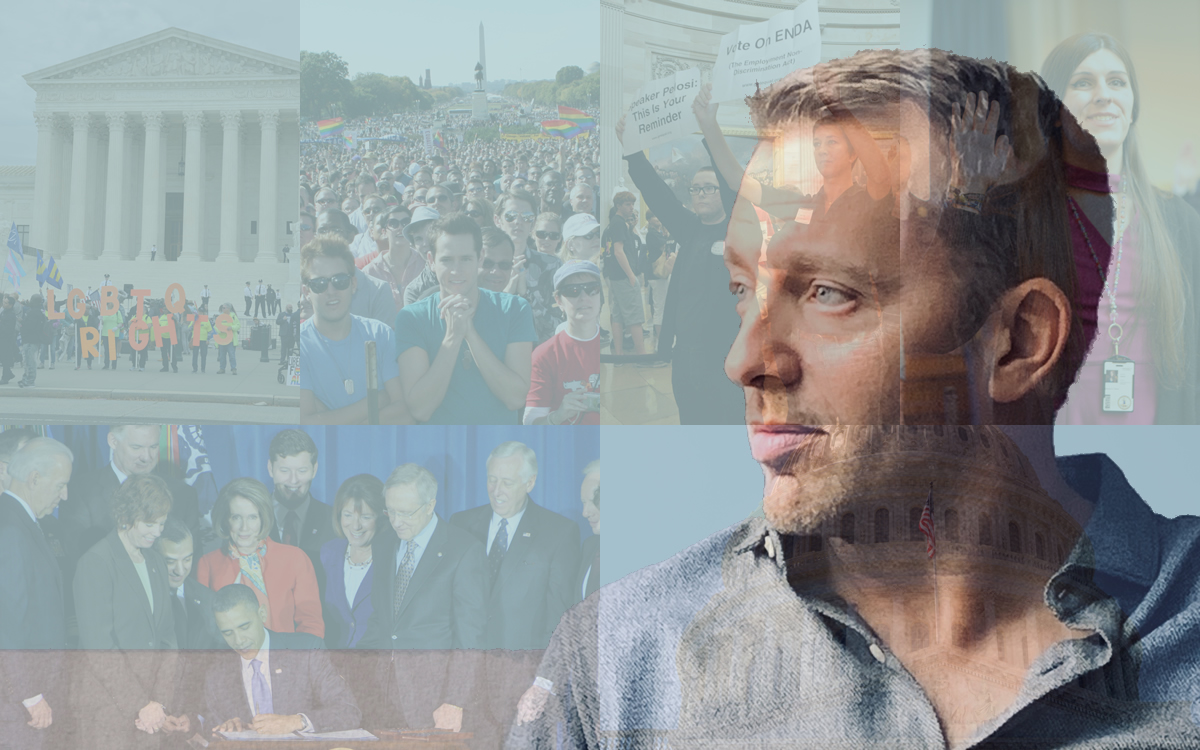
Washington Blade Editor Kevin Naff this week published his first book, “How We Won the War for LGBTQ Equality — And How Our Enemies Could Take It All Away.”
The book commemorates Naff’s 20 years editing the Blade and features two decades of his work updated with new insights and commentary, touching on everything from the fight for marriage equality and repeal of “Don’t Ask, Don’t Tell” to celebrity encounters and the outing of public figures.
It’s part history lesson and part celebrity dish, available now at Amazon.com and kevinnaff.com.
The following is adapted from an interview between Rob Watson of Rated LGBT Radio and Naff. To listen to the full interview, visit blogtalkradio.com/ratedlgbtradio.
The two-decades long war in Afghanistan was the longest in U.S. history. Wars for civil rights have been much longer, and for many, nowhere near over. Ours for LGBTQ rights is a prime example.
While gains in our particular war have been many, and by historical standards, have come incredibly fast, they have now been fought by several generations.
Author and Washington Blade editor Kevin Naff highlights this perspective in his new book “How We Won the War for LGBTQ Equality.”
“Two decades represents a mere blip in the arc of a civil rights struggle, yet in that span, the LGBTQ community in the United States went from legally second-class status to enjoying near full protection of federal law along with widespread societal acceptance and even full marriage rights,” Naff writes.
He is aware that this look into our collective history represents a glimpse into a broader, and more painful fight, where many LGBTQ families lost their fights. “Not a week has gone by in my 20 years at the Blade that I didn’t think of the generation of gay men before me who didn’t live to see all of this progress,” he writes. “They inspire me. I do this work for them. They did not die in vain. Not just the men who died, but the lesbians who cared for them when no one else would. They are not forgotten.”
“This is not a dry history lesson type of book, but if you want to learn, the book does tell the marriage equality battle, ‘Don’t Ask Don’t Tell,’ and how a lot of our wins unfolded,” Naff declared when he sat down with me on the Rated LGBT Radio podcast.
He’s right. “How to Win” shares many of Naff’s articles written as events were unfolding. Absorbing these as a modern reader, I found my deep desire to fight against anything less than full equality, and repression against our abilities to self-actualize, getting hungrier and hungrier.
For those wanting “shade and the truth,” this book delivers, as it’s filled with page-turning anecdotes to keep you glued and voracious right to the very end.
Like many of us, Naff was persecuted for being perceived as gay when he was a kid. “The walk home from school was particularly terrifying — I walked alone and my tormentors would often follow, hurling rocks and anti-gay slurs. Sometimes the fear was so intense that I would feign sick just to avoid a day of the torture,” he writes. His youth was not a time when there was much sympathy, or help, for LGBTQ children. It was the time of do-it-yourself. “There was the day I finally snapped, in seventh grade, while being taunted by a kid in gym class. The insults and threats became too much and all the anger rushed out of me…I defended myself. And it felt good,” Naff reveals. He acknowledges that his bullies “forced me to cultivate an inner strength.”
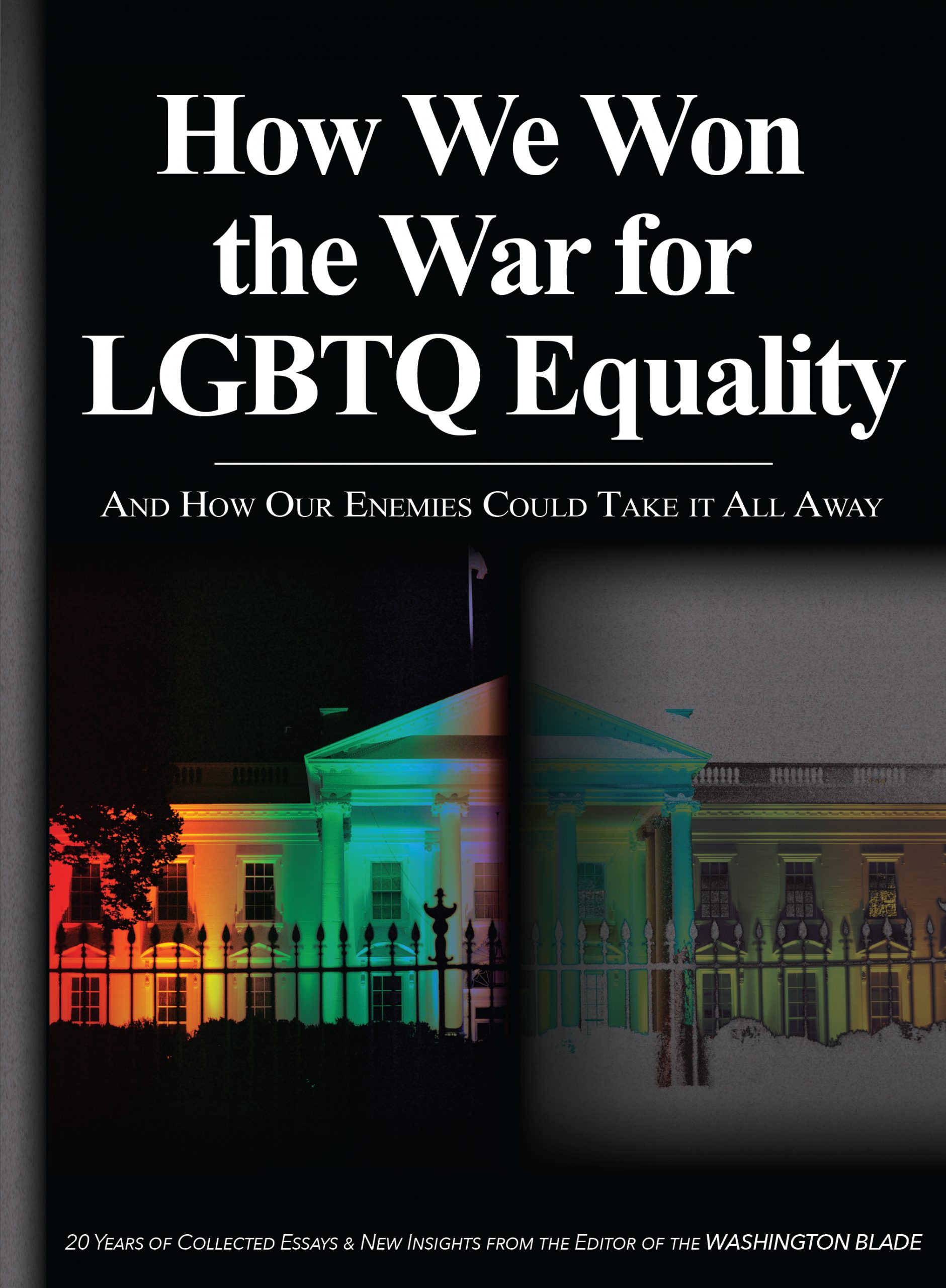
Years later, as a journalist and conscience for public progressives, Naff’s unwillingness to back down, and passion to stand and fight, emerge time and time again in the book.
While he writes of contempt for George W. Bush’s opportunistic use of same-sex marriage as a campaign wedge issue, Naff stepped up his fight to the next level when facing Maryland Gov. Martin O’Malley. O’Malley was a progressive who used LGBTQ goodwill and campaign muscle to get elected. When an appeals court rejected same-sex marriage, O’Malley went from champion to cad at light speed. He issued an offensive statement about Catholic sacraments and asserted his opposition to marriage equality.
So, Naff outed the governor’s brother, Patrick. (That the brother was gay was a fact commonly known in social circles, but had not reached the media level previously).
The governor was mad, but Naff landed a one-on-one interview with O’Malley, and eventually a path to the governor flipping support on the issue.
Naff’s unwillingness to allow LGBTQ people to be pushed around is not just with public figures who use us and then abandon us, people he calls “duplicitous allies,” but he feels no hesitancy in confronting Hollywood icons and their cults, as John Travolta found out.
Naff went viral with a piece in 2007 when he wrote a blog post criticizing the casting of a potentially closeted and indoctrinated Scientologist John Travolta, as the Divine-inspired drag role in John Waters’ musical version of “Hairspray.”
That post “generated the most attention and traffic of anything I’ve written,” Naff says. “My blog post encouraged gay fans to boycott the new film because its star, John Travolta, was Scientology’s No. 2 spokesperson and his cult was known to engage in reparative therapy, the debunked practice of changing one’s sexual orientation.”
Mainstream gossip media declared that “the gays were boycotting Hairspray.” Soon Naff found himself inundated with death threats, and being summoned by both Fox News and the Church of Scientology itself.
Naff agreed to a face off with Fox’s Bill O’Reilly whose friendly off-air persona turned rabid in front of the cameras. When Naff pointed out that he was comparing gay people to drug addicts, O’Reilly snarled, “Don’t be a wise guy, Mr. Naff.”
Naff’s biggest sin, according to the Church of Scientology, was referring to it as a “cult.” To prove that they weren’t, the president of the D.C. church invited Naff for a meeting. Upon arrival at the Scientology mansion in Dupont Circle, the church president gave Naff a tour, which included an “immaculate first-floor formal office.” After inquiring whose office it was, Naff was told that it was “Mr. Hubbard’s office” and that every church location had one. Scientology founder L. Ron Hubbard had been dead for 21 years at that point.
“Cult!” Naff and I exclaimed in unison as he told me the story.
As editor of the Washington Blade, Naff is an established invitee to the journalistic event of each season: The White House Correspondents’ Association Dinner. He writes about his dates he has taken each year from the heavenly (Judith Light) to the disastrous (Kathy Griffin). The latter made a point to scream expletives at Trump administration officials in attendance.
While Naff could appreciate the sentiment, Griffin left D.C. the next day, while he, the in-town professional, had to face all of her targets.
Laverne Cox was also a standout date. She accompanied Naff the night after Caitlyn Jenner’s televised coming out interview aired. “If one more reporter asks me about fucking Caitlyn Jenner, I’m going to lose it,” Naff reports Cox confiding. His story about Laverne Cox was not so much about Jenner, however, but reads like something out of “Oceans 8.”
Unlike the movie, Naff’s evening did not feature a planned jewel heist, nor were Sandra Bullock and Cate Blanchett anywhere in sight, but it did feature a pricey borrowed diamond bracelet that went missing off of Cox’s wrist. She feared the jeweler would accuse her of theft. The dilemma ultimately had one of the most famous transgender actresses of all time, and the editor of the nation’s oldest LGBTQ publication frantically crawling under banquet tables surrounded by the Washington elite and press corps.
Cox finally found the bauble at 4 a.m., deep at the bottom of her purse.
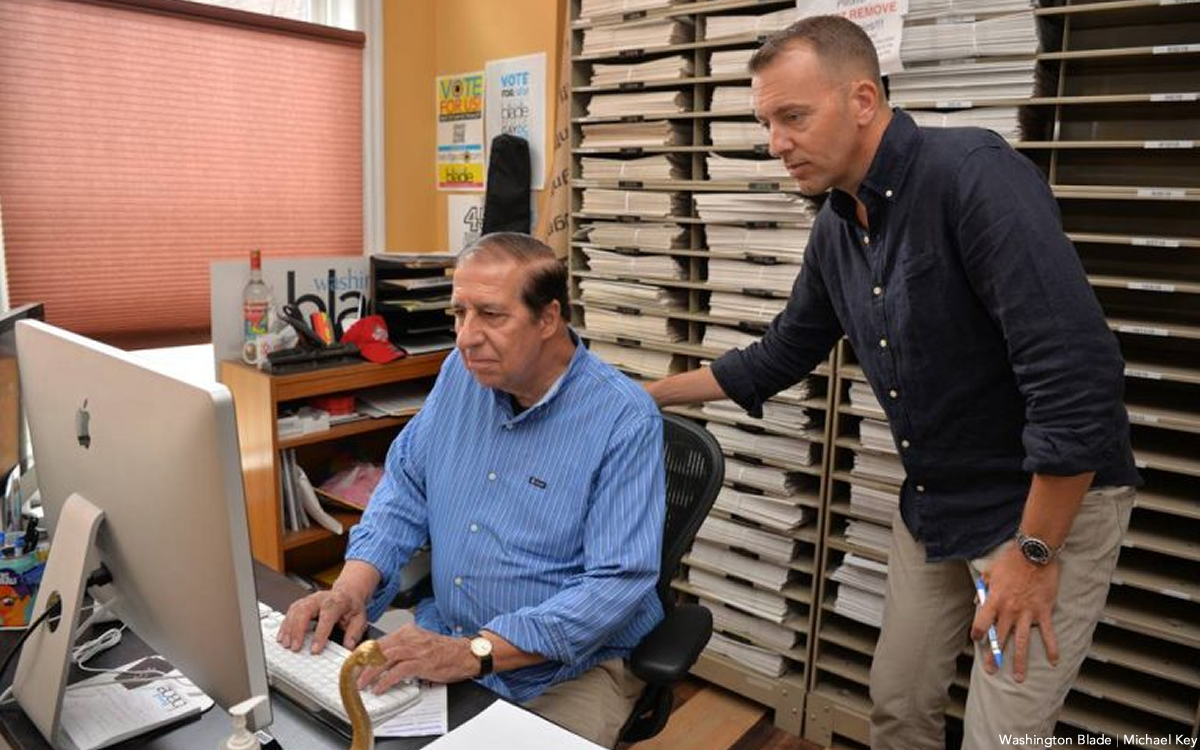
“How We Won” covers the arc of LGBTQ history over two crucial decades and hits on topics from bullying of youth, the “ex-gay” movement, the military, religion, police, and, of course, marriage equality. Besides his adventures with cults chasing him down, A-lister dates and angry governors, Naff also shares poignant emotional moments of his own.
One came in shocking fashion when he arrived to the Washington Blade offices one morning to find two men from the Blade’s then-parent company. They were there to shut the place down after a Chapter 7 bankruptcy filing.
Naff retreated to his office, scrambling to think out the next move. The Blade staff resolved to not give up and successfully put out a slim newssheet for a few months until they could recover the Blade’s assets from the bankruptcy court and keep the legacy alive.
One of the great ironies of the LGBTQ movement is that many people who have fought for progress are not the ones who live to enjoy all the gains. They win the battles but leave the new world for others to fully enjoy.
Naff is one of those pioneers. After an adult life fighting for LGBTQ people to exercise the right to marry our loves in a fully public, accepting way, challenging all who might deny a same-sex couple service, Naff had a life-changing revelation that made him choose to walk away from a huge wedding event for himself.
Months before his own wedding, he was in a serious automobile accident. He called his fiancé and pitched the idea of a small ceremony on the beach, followed by a gay cruise together around Asia. “Something happens when you are faced with a life-or-death kind of moment. It changes what’s important. It changes your perspective,” he tells me.
Naff started out his writing career as a 10-year-old writing to the Washington Post as a pissed-off Baltimore Orioles fan protesting the Major League Baseball strike of 1981. “I am STILL a pissed off Baltimore Orioles fan,” he says. From day one, he found his knack for observation and his gift for pointed communication. Those are the same qualities he brings to his participation in, and presentation of, our LGBTQ historic trek to equality victory.
In “How We Won,” he tells an unvarnished story, as he saw it, as he wrote about it, and continues to tell it, at the helm of the Washington Blade. He tells of the right-wing figures he confronted and continues to confront. He thinks of the term “outing” as an archaic term. Today, it is simply “truth-telling” of those in the public eye. As much as the title of his book implies a “win” and completion, I am confident that the 10-year-old pissed-off Baltimore Orioles fan within is not done.
Naff’s subtitle, after all, is “And How Our Enemies Could Take it All Away.”
A post-war recap for Kevin Naff might have been best expressed by the fictional Mr. Incredible when he said, “No matter how many times you save the world, it always manages to get back in jeopardy again. Sometimes I just want it to stay saved!”
As homophobic, transphobic Republican legislation sweeps the country, it is clear, we are not done and a new chapter in the war has begun. At the end of “The Incredibles,” continuing the allegory, after a family of progressives have saved the world, a huge noisy crew disrupts it (symbolic of the MAGA wave). Out pops the Under-Miner who declares, “Behold, The Under-Miner! I am always beneath you, but NOTHING is beneath me! (As it seems so for the GOP.) I hereby declare war on peace and happiness! Soon all will tremble before me!”
The music swells, and the family of authentic-selves look at each other with a smirk, opening their shirts to reveal that they are Incredibles. They know that this time, like last time, they will not be defeated.
So stands Kevin Naff, looking back and looking forward, with his band of Incredibles, LGBTQ journalists worldwide, and the rest of us, ready to fight the fight again.
As we prepare for the new battles ahead, the principles of “How We Won” will be our tools for ultimate victory: be visible, be assertive, confront lies and injustice, reinvent, rebirth and in the end, hold our personal loves sacred.
Kevin Naff and Mr. Incredible would stand for nothing less. Neither should you.
Books
‘The Vampire Chronicles’ inspire LGBTQ people around the world
AMC’s ‘Interview with the Vampire’ has brought feelings back to live

Four kids pedaled furiously, their bicycles wobbling over cracked pavement and uneven curbs. Laughter and shouted arguments about which mystical creature could beat which echoed down the quiet street. They carried backpacks stuffed with well-worn paperbacks — comic books and fantasy novels — each child lost in a private world of monsters, magic, and secret codes. The air hummed with the kind of adventure that exists only at the edge of imagination, shaped by an imaginary world created in another part of the planet.
This is not a description of “Stranger Things,” nor of an American suburb in the 1980s. This is a small Russian village in the early 2000s — a place without paved roads, where most houses had no running water or central heating — where I spent every summer of my childhood. Those kids were my friends, and the world we were obsessed with was “The Vampire Chronicles” by Anne Rice.
We didn’t yet know that one of us would soon come out as openly bi, or that another — me — would become an LGBTQ activist. We were reading our first queer story in Anne Rice’s books. My first queer story. It felt wrong. And it felt extremely right. I haven’t accepted that I’m queer yet, but the easiness queerness was discussed in books helped.
Now, with AMC’s “Interview with the Vampire,” starring Jacob Anderson as Louis de Pointe du Lac — a visibly human, openly queer, aching vampire — and Sam Reid as Lestat de Lioncourt, something old has stirred back to life. Louis remains haunted by what he is and what he has done. Lestat, meanwhile, is neither hero nor villain. He desires without apology, and survives without shame.
I remember my bi friend — who was struggling with a difficult family — identifying with Lestat. Long before she came out, I already saw her queerness reflected there. “The Vampire Chronicles” allowed both of us to come out, at least to each other, with surprising ease despite the queerphobic environment.
While watching — and rewatching — the series over this winter holiday, I kept thinking about what this story has meant, and still means, for queer youth and queer people worldwide. Once again, this is not just about “the West.” I read comments from queer Ukrainian teenagers living under bombardment, finding joy in the show. I saw Russian fans furious at the absurdly censored translation by Amediateca, which rendered “boyfriend” as “friend” or even “pal,” turning the central relationship between two queer vampires into near-comic nonsense. Mentions of Putin were also erased from the modern adaptation — part of a broader Russian effort to eliminate queer visibility and political critique altogether.
And yet, fans persist to know the real story. Even those outside the LGBTQ community search for uncensored translations or watch with subtitles. A new generation of Eastern European queers is finding itself through this series.
It made me reflect on the role of mass culture — especially American mass culture — globally. I use Ukraine and Russia as examples because I’m from Ukraine, spent much of my childhood and adolescence in Russia, and speak both languages. But the impact is clearly broader. The evolution of mass culture changes the world, and in the context of queer history, “Interview with the Vampire” is one of the brightest examples — precisely because of its international reach and because it was never marketed as “gay literature,” but as gothic horror for a general audience.
With AMC now producing a third season, “The Vampire Lestat,” I’ve seen renewed speculation about Lestat’s queerness and debates about how explicitly the show portrays same-sex relationships. In the books, vampires cannot have sex in a “traditional” way, but that never stopped Anne Rice from depicting deeply homoromantic relationships, charged with unmistakable homoerotic tension. This is, after all, a story about two men who “adopt” a child and form a de facto queer family. And this is just the first book — in later novels we see a lot of openly queer couples and relationships.
The first novel, “Interview with the Vampire” was published in 1976, so the absence of explicit gay sex scenes is unsurprising. Later, Anne Rice — who identified as queer — described herself as lacking a sense of gender, seeing herself as a gay man and viewing the world in a “bisexual way.” She openly confirmed that all her vampires are bisexual: a benefit of the Dark Gift, where gender becomes irrelevant.
This is why her work resonates so powerfully with queer readers worldwide, and why so many recognize themselves in her vampires. For many young people I know from Eastern Europe, “Interview with the Vampire” was the first book in which they ever encountered a same-sex relationship.
But the true power of this universe lies in the fact that it was not created only for queer audiences. I know conservative Muslims with deeply traditional views who loved “The Vampire Chronicles” as teenagers. I know straight Western couples who did too. Even people who initially found same-sex relationships unsettling often became more tolerant after reading the books, watching the movie or the show. It is harder to hate someone who reminds you of a beloved character.
That is the strength of the story: it was never framed as explicitly queer or purely romantic, gothic and geeky audiences love it. “The Vampire Chronicles” are not a cure for queerphobia, but they are a powerful tool for making queerness more accessible. Popular culture offers a window into queer lives — and the broader that window, the more powerful it becomes.
Other examples include Will from “Stranger Things,” Ellie and Dina from “The Last of Us” (both the game and the series), or even the less mainstream but influential sci-fi show “Severance.” These stories allow audiences around the world to see queer people beyond stereotypes. That is the power of representation — not just for queer people themselves, but for society as a whole. It makes queer people look like real people, even when they are controversial blood-drinkers with fangs, or two girls surviving a fungal apocalypse.
Mass culture is a universal language, spoken worldwide. And that is precisely why censorship so often tries — and fails — to silence it.
Books
Feminist fiction fans will love ‘Bog Queen’
A wonderful tale of druids, warriors, scheming kings, and a scientist
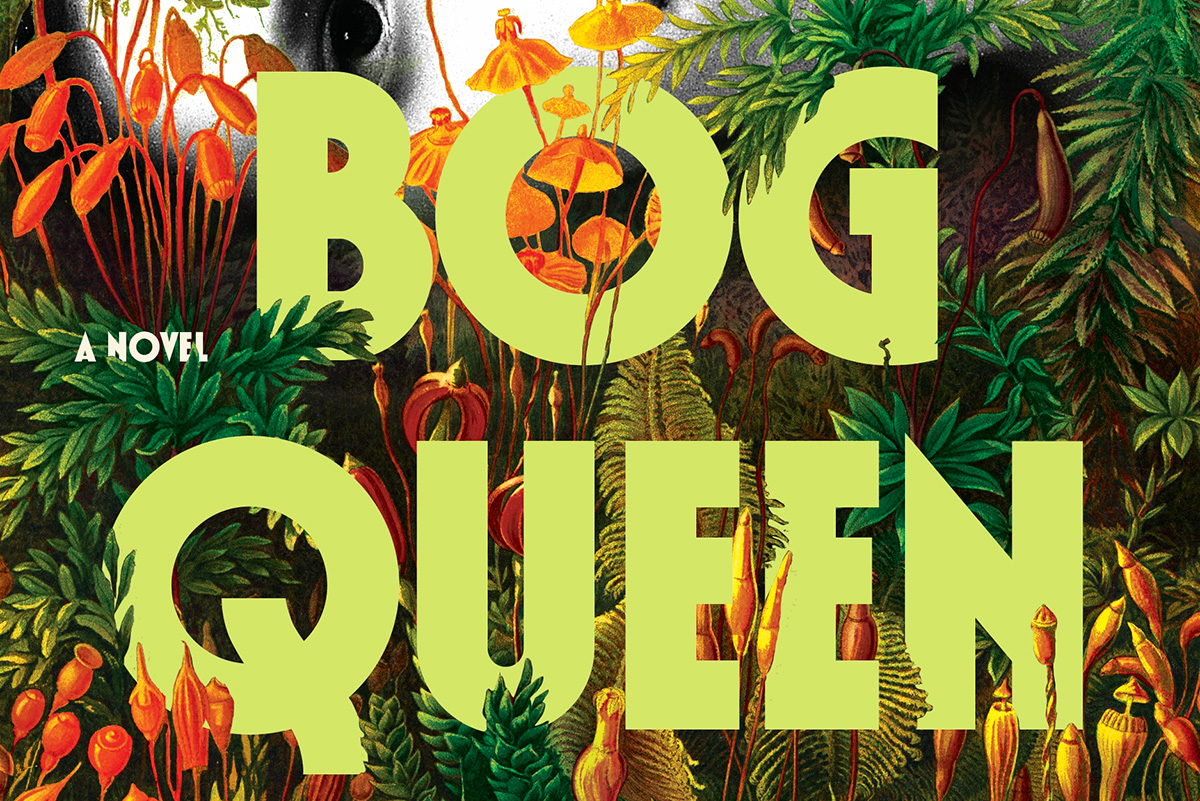
‘Bog Queen’
By Anna North
c.2025, Bloomsbury
$28.99/288 pages
Consider: lost and found.
The first one is miserable – whatever you need or want is gone, maybe for good. The second one can be joyful, a celebration of great relief and a reminder to look in the same spot next time you need that which you first lost. Loss hurts. But as in the new novel, “Bog Queen” by Anna North, discovery isn’t always without pain.

He’d always stuck to the story.
In 1961, or so he claimed, Isabel Navarro argued with her husband, as they had many times. At one point, she stalked out. Done. Gone, but there was always doubt – and now it seemed he’d been lying for decades: when peat cutters discovered the body of a young woman near his home in northwest England, Navarro finally admitted that he’d killed Isabel and dumped her corpse into a bog.
Officials prepared to charge him.
But again, that doubt. The body, as forensic anthropologist Agnes Lundstrom discovered rather quickly, was not that of Isabel. This bog woman had nearly healed wounds and her head showed old skull fractures. Her skin glowed yellow from decaying moss that her body had steeped in. No, the corpse in the bog was not from a half-century ago.
She was roughly 2,000 years old.
But who was the woman from the bog? Knowing more about her would’ve been a nice distraction for Agnes; she’d left America to move to England, left her father and a man she might have loved once, with the hope that her life could be different. She disliked solitude but she felt awkward around people, including the environmental activists, politicians, and others surrounding the discovery of the Iron Age corpse.
Was the woman beloved? Agnes could tell that she’d obviously been well cared-for, and relatively healthy despite the injuries she’d sustained. If there were any artifacts left in the bog, Agnes would have the answers she wanted. If only Isabel’s family, the activists, and authorities could come together and grant her more time.
Fortunately, that’s what you get inside “Bog Queen”: time, spanning from the Iron Age and the story of a young, inexperienced druid who’s hoping to forge ties with a southern kingdom; to 2018, the year in which the modern portion of this book is set.
Yes, you get both.
Yes, you’ll devour them.
Taking parts of a true story, author Anna North spins a wonderful tale of druids, vengeful warriors, scheming kings, and a scientist who’s as much of a genius as she is a nerd. The tale of the two women swings back and forth between chapters and eras, mixed with female strength and twenty-first century concerns. Even better, these perfectly mixed parts are occasionally joined by a third entity that adds a delicious note of darkness, as if whatever happens can be erased in a moment.
Nah, don’t even think about resisting.
If you’re a fan of feminist fiction, science, or novels featuring kings, druids, and Celtic history, don’t wait. “Bog Queen” is your book. Look. You’ll be glad you found it.
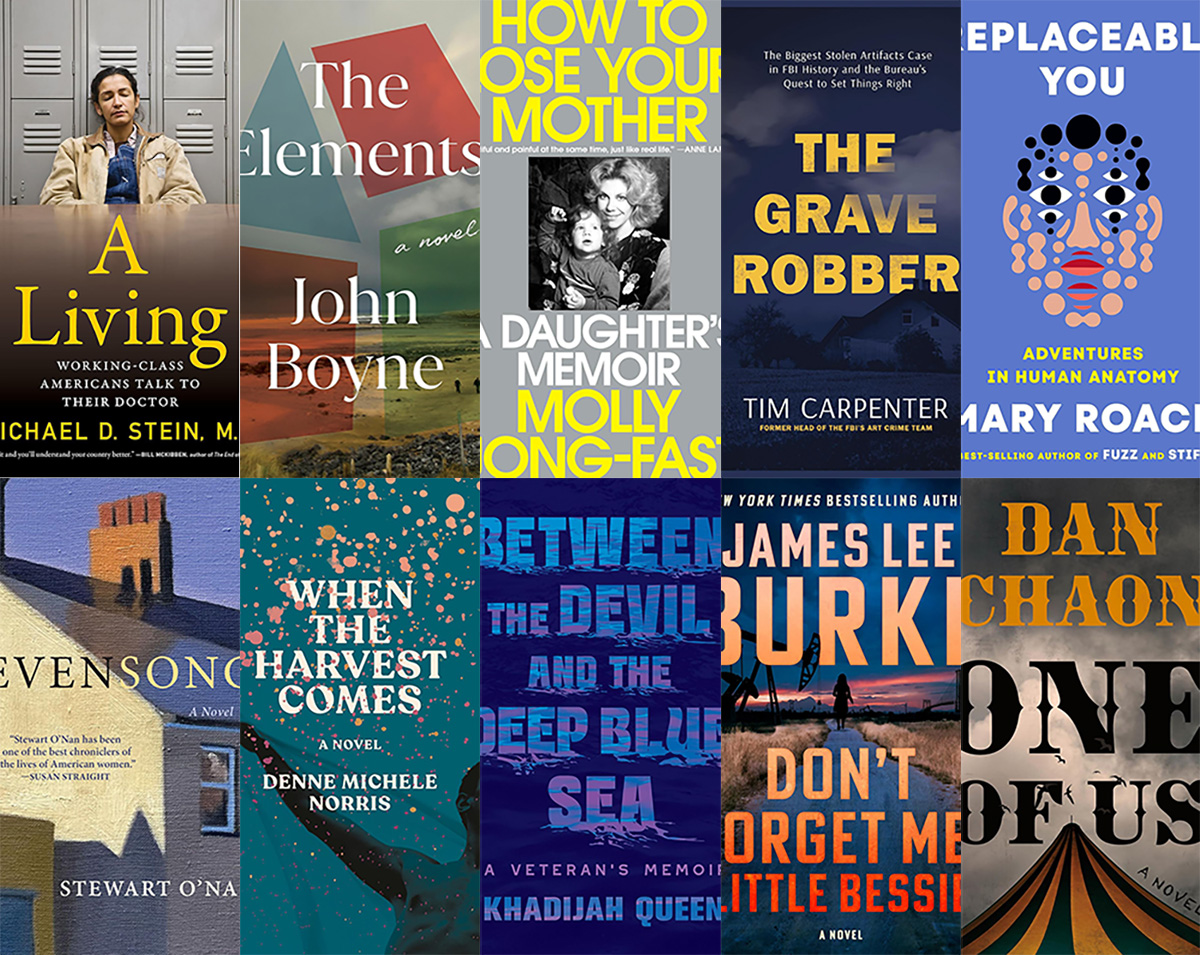
This past year, you’ve often had to make do.
Saving money here, resources there, being inventive and innovative. It’s a talent you’ve honed, but isn’t it time to have the best? Yep, so grab these Ten Best of 2025 books for your new year pleasures.
Nonfiction
Health care is on everyone’s mind now, and “A Living: Working-Class Americans Talk to Their Doctor” by Michael D. Stein, M.D. (Melville House, $26.99) lets you peek into health care from the point of view of a doctor who treats “front-line workers” and those who experience poverty and homelessness. It’s shocking, an eye-opening book, a skinny, quick-to-read one that needs to be read now.
If you’ve been doing eldercare or caring for any loved one, then “How to Lose Your Mother: A Daughter’s Memoir” by Molly Jong-Fast (Viking, $28) needs to be in your plans for the coming year. It’s a memoir, but also a biography of Jong-Fast’s mother, Erica Jong, and the story of love, illness, and living through the chaos of serious disease with humor and grace. You’ll like this book especially if you were a fan of the author’s late mother.
Another memoir you can’t miss this year is “Between the Devil and the Deep Blue Sea: A Veteran’s Memoir” by Khadijah Queen (Legacy Lit, $30.00). It’s the story of one woman’s determination to get out of poverty and get an education, and to keep her head above water while she goes below water by joining the U.S. Navy. This is a story that will keep you glued to your seat, all the way through.
Self-improvement is something you might think about tackling in the new year, and “Replaceable You: Adventures in Human Anatomy” by Mary Roach (W.W. Norton & Company, $28.99) is a lighthearted – yet real and informative – look at the things inside and outside your body that can be replaced or changed. New nose job? Transplant, new dental work? Learn how you can become the Bionic Person in real life, and laugh while you’re doing it.
The science lover inside you will want to read “The Grave Robber: The Biggest Stolen Artifacts Case in FBI History and the Bureau’s Quest to Set Things Right” by Tim Carpenter (Harper Horizon, $29.99). A history lover will also want it, as will anyone with a craving for true crime, memoir, FBI procedural books, and travel books. It’s the story of a man who spent his life stealing objects from graves around the world, and an FBI agent’s obsession with securing the objects and returning them. It’s a fascinating read, with just a little bit of gruesome thrown in for fun.
Fiction
Speaking of a little bit of scariness, “Don’t Forget Me, Little Bessie” by James Lee Burke (Atlantic Monthly Press, $28) is the story of a girl named Bessie and her involvement with a cloven-hooved being who dogs her all her life. Set in still-wild south Texas, it’s a little bit western, part paranormal, and completely full of enjoyment.
“Evensong” by Stewart O’Nan (Atlantic Monthly Press, $28) is a layered novel of women’s friendships as they age together and support one another. The characters are warm and funny, there are a few times when your heart will sit in your throat, and you won’t be sorry you read it. It’s just plain irresistible.
If you need a dark tale for what’s left of a dark winter season, then “One of Us” by Dan Chaon (Henry Holt, $28), it it. It’s the story of twins who become orphaned when their Mama dies, ending up with a man who owns a traveling freak show, and who promises to care for them. But they can’t ever forget that a nefarious con man is looking for them; those kids can talk to one another without saying a word, and he’s going to make lots of money off them. This is a sharp, clever novel that fans of the “circus” genre shouldn’t miss.
“When the Harvest Comes” by Denne Michele Norris (Random House, $28) is a wonderful romance, a boy-meets-boy with a little spice and a lot of strife. Davis loves Everett but as their wedding day draws near, doubts begin to creep in. There’s homophobia on both sides of their families, and no small amount of racism. Beware that there’s some light explicitness in this book, but if you love a good love story, you’ll love this.
Another layered tale you’ll enjoy is “The Elements” by John Boyne (Henry Holt, $29.99), a twisty bunch of short stories that connect in a series of arcs that begin on an island near Dublin. It’s about love, death, revenge, and horror, a little like The Twilight Zone, but without the paranormal. You won’t want to put down, so be warned.
If you need more ideas, head to your local library or bookstore and ask the staff there for their favorite reads of 2025. They’ll fill your book bag and your new year with goodness.
Season’s readings!
The Blade may receive commissions from qualifying purchases made via this post.
-

 U.S. Supreme Court5 days ago
U.S. Supreme Court5 days agoSupreme Court hears arguments in two critical cases on trans sports bans
-

 District of Columbia5 days ago
District of Columbia5 days agoRuby Corado sentenced to 33 months in prison
-

 Commentary5 days ago
Commentary5 days agoHonoring 50 queer, trans women with inaugural ‘Carrying Change’ awards
-

 a&e features5 days ago
a&e features5 days agoVisible and unapologetic: MAL brings the kink this weekend


















